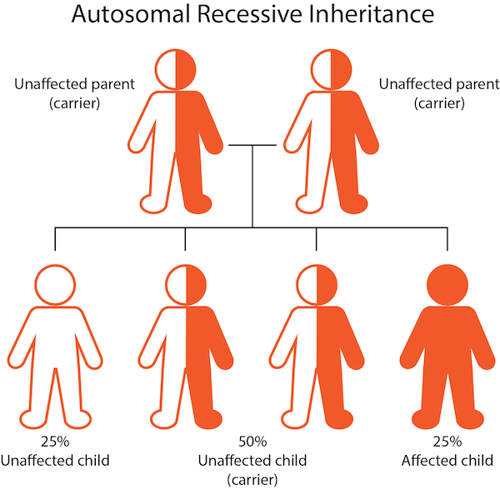
What are the different genetic mutations that can cause cystic fibrosis?
November 29, 2011

- Related Topics:
- Autosomal recessive inheritance,
- Genetic conditions,
- Cystic fibrosis,
- Carrier
A curious adult from Switzerland asks:
"I heard that there is more than one genetic mutation that can cause cystic fibrosis. Do the mutations cause different kinds of disease?"
You're right—there are lots of ways to end up with cystic fibrosis (CF). And when I say lots, I mean thousands!
The most common and best understood way to get CF is to have something wrong with your CFTR gene*. Scientists have found over 1800 differences in this gene that can lead to CF (although most are pretty rare).
However, not all of these defects affect the CFTR gene in the same way. Some really mess up the gene so it doesn't work at all, while others mess it up just a little bit. This is one of the reasons why patients can have such a wide range of CF symptoms. Usually the more messed up a CFTR gene is, the worse the symptoms.
Notice the "usually"...there can be more to someone's CF symptoms than just his or her CFTR gene! DNA differences outside of the CFTR gene can affect how bad someone's symptoms are, too.
And as if that isn't enough variety, there are also ways to get CF that don't involve the CFTR gene at all. These diseases are called "variant CF," and we still don't really understand what causes them. (And we won't be dealing with them in this answer.)
Because there are many different ways to end up with CF and such a wide range of symptoms, treatments can be very different too. A mild case of CF requires a much different set of medicines than a severe case.
What I thought I'd do for the rest of the answer is talk a bit about how problems with the CFTR gene can cause different severities of CF. And then I'll finish up by talking about how other genes might play a role in how bad CF symptoms are.
*CFTR stands for cystic fibrosis transmembrane conductance regulator
Double Trouble
You may already know that we each have two copies of most every gene in our DNA. We got one copy from our moms and one from our dads.
A person needs to get a defective copy of the CFTR gene from both mom and dad to end up with CF. When both copies have to be damaged to cause a disease like CF, that disease is called recessive.
If you have just one damaged copy of the CFTR gene, then you are called a carrier for CF. Carriers do not have CF symptoms, although they can pass their broken CFTR gene down to their own kids.

But what if you get two defective versions of the CFTR gene that aren't the same? Well that depends on what versions you got.
If both versions keep the CFTR gene from working at all, then the disease will be pretty severe. But if at least one CFTR gene is even just a little bit OK, then the symptoms might not be as serious.
Not All Gene Versions Are Created Equal
Our DNA has thousands of genes that we got from our parents. As I said before, genetic diseases like CF happen when something goes wrong with at least one of these genes.
Each of our genes contains the instructions for making a specific protein. And each protein has a specific job to do in our cells.
The CFTR gene has the information our cells use to make the CFTR protein. Its job is to move chloride ions into and out of our cells.

Severe cases of CF happen when there's not enough CFTR protein in our cells. This can be because not enough gets made or what does get made is so badly damaged it can't do its job.
When the CFTR protein isn't able to do its job, chloride ions can't be moved into and out of our cells. This explains why people with CF have salty sweat and thick mucus in their lungs. (It's the thick mucus that causes breathing problems and bacterial infections.)
The most common version of CFTR that causes CF is called "ΔF508." It causes more than 70% of CF cases.
Even though the ΔF508 version of CFTR protein is missing just a small part of itself, it is pretty messed up. It looks very different from the normal protein and our cells get rid of it before it can get to its right place to work.
Four other common CFTR mutations are called G551D, R117H, 621+1 G>T and G542X. Each of these mutations does something different to the CFTR gene. Some prevent the CFTR protein from being made in the first place, and others make a badly damaged protein that can't work very well.
Most of these mutations cause CF symptoms that are pretty severe. But R117H and the many more rare CFTR mutations can cause milder disease. This is because at least some of the CFTR protein is still made and works OK.
So it really comes down to the quantity and quality of the CFTR protein being made. If there is too little of the protein or it's really defective, then you'll have pretty bad symptoms. But if you have even a small amount (>1%) of working CFTR, then your symptoms might not be so bad.
But things get more complicated than this. Let's say that there are two people with CF who have the exact same versions of the CFTR genes, but their symptoms are very different. One person has a very severe form of the disease, while the other person has a much milder one. What do you think is going on here?

CFTR Isn't the Whole Story
In reality, it isn't just what kind of CFTR genes someone has that matters. Sometimes other genes control the severity of someone's CF disease, too.
Imagine that you are born with a gene difference that causes you to have trouble fighting off lung infections. Normally having a cold is just a little bit worse for you.
Now imagine that you also inherited two broken CFTR genes that give you CF. Remember that one of the big issues with CF is having many lung infections.
So this means that you will have worse symptoms than someone who can battle lung infections more easily. Even though you both have the same CFTR genes, you'll do worse because of that other gene difference you have.
This isn't just a made up example. There is actually a gene like this – MLB2. People with certain versions of this gene can't fight off lung infections as well as people with other versions. So these people also have more severe CF symptoms if they have defective CFTR genes.
When another set of genes influences how bad symptoms are in a genetic disorder, those other genes are called modifiers. Some modifiers make things worse (like in the MBL2 example), while others can make things better.
And other modifiers are less clear-cut. One example is the TGFβ gene in CF patients.
Some studies show that lung problems aren't as bad for people with certain versions of TGFβ gene. But another study came to the opposite conclusion. So we haven't really figured out completely why two people with the exact same CFTR versions end up with very different sets of symptoms. But we do know that even small differences in other genes can make a huge impact.
Read More:
- National heart, lung, and blood institute: More on cystic fibrosis
- Medline: CFTR gene
- Cystic fibrosis foundation: Types of CFTR Mutations

Author: Dr. Maggie Pearce
When this answer was published in 2011, Maggie was a post-doctoral fellow in the Department of Biology, studying protein quality control and neurodegeneration in Ron Kopito's laboratory. Maggie wrote this answer while participating in the Stanford at The Tech program.
 Skip Navigation
Skip Navigation
